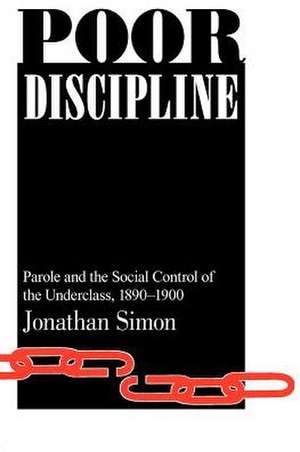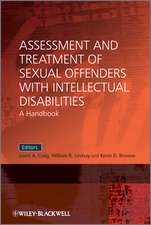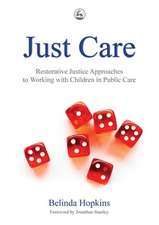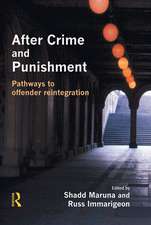Poor Discipline: Studies in Crime and Justice
Autor Jonathan Simonen Limba Engleză Paperback – 31 oct 1993
This powerful book reveals how modern strategies of punishment—and, by all accounts, their failure—relate to political and economic transformations in society at large. Jonathan Simon uses the practice of parole in California as a window to the changing historical understanding of what a corrections system does and how it works. Because California is representative of policies and practices on a national level, Simon explicitly presents his findings within a national framework.
When parole first emerged as a corrections strategy in the nineteenth century, work was supposed to keep ex-prisoners out of trouble. This strategy foundered in the changing economy after World War II. What followed was a rehabilitative strategy, where the clinical expertise of the parole agent replaced the discipline of the industrial labor market in defining and controlling criminal deviance. Today, Simon argues, as drastic changes in the economy have virtually locked out an entire class, rehabilitation has given way to mere management. The effect is isolation of the offender, either in jail or in an underclass community; the result is an escalating cycle of imprisonment, destabilization, and insecurity.
No significant improvement in the current penal crisis can be expected until we better understand the relationship between punishment and social order, a relationship which this book explores in theoretical, historical, and practical detail.
When parole first emerged as a corrections strategy in the nineteenth century, work was supposed to keep ex-prisoners out of trouble. This strategy foundered in the changing economy after World War II. What followed was a rehabilitative strategy, where the clinical expertise of the parole agent replaced the discipline of the industrial labor market in defining and controlling criminal deviance. Today, Simon argues, as drastic changes in the economy have virtually locked out an entire class, rehabilitation has given way to mere management. The effect is isolation of the offender, either in jail or in an underclass community; the result is an escalating cycle of imprisonment, destabilization, and insecurity.
No significant improvement in the current penal crisis can be expected until we better understand the relationship between punishment and social order, a relationship which this book explores in theoretical, historical, and practical detail.
Preț: 290.34 lei
Nou
Puncte Express: 436
Preț estimativ în valută:
55.57€ • 60.39$ • 46.71£
55.57€ • 60.39$ • 46.71£
Carte tipărită la comandă
Livrare economică 21 aprilie-05 mai
Preluare comenzi: 021 569.72.76
Specificații
ISBN-13: 9780226758572
ISBN-10: 0226758575
Pagini: 296
Dimensiuni: 152 x 229 x 20 mm
Greutate: 0.41 kg
Ediția:1
Editura: University of Chicago Press
Colecția University of Chicago Press
Seria Studies in Crime and Justice
ISBN-10: 0226758575
Pagini: 296
Dimensiuni: 152 x 229 x 20 mm
Greutate: 0.41 kg
Ediția:1
Editura: University of Chicago Press
Colecția University of Chicago Press
Seria Studies in Crime and Justice
Notă biografică
Jonathan Simon is associate professor of law at the University of Miami.
Cuprins
Acknowledgments
Introduction: The Crisis of Penological Modernism
Part I: Parole as Normalization
1. Surety of "Good Behavior": An Early Modern Model of Community Corrections
2. Disciplinary Parole
3. Clinical Parole
Part II: From Normalization to Management
4. The Legal and Political Environment of Contemporary Parole
5. Parole and the Hardening of Urban Poverty, 1970-1990
6. New Technologies of Control, 1970-1990
Part III: Management and Governability
7. Parole and Return to Imprisonment
8. Penal Postmodernism: Power without Narrative
Conclusion: Dangerous Classes, Laboring Classes, Underclasses
References
Index
Introduction: The Crisis of Penological Modernism
Part I: Parole as Normalization
1. Surety of "Good Behavior": An Early Modern Model of Community Corrections
2. Disciplinary Parole
3. Clinical Parole
Part II: From Normalization to Management
4. The Legal and Political Environment of Contemporary Parole
5. Parole and the Hardening of Urban Poverty, 1970-1990
6. New Technologies of Control, 1970-1990
Part III: Management and Governability
7. Parole and Return to Imprisonment
8. Penal Postmodernism: Power without Narrative
Conclusion: Dangerous Classes, Laboring Classes, Underclasses
References
Index























